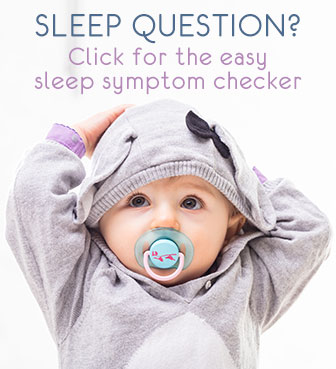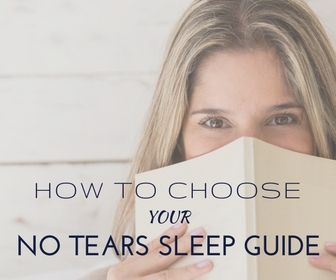My baby won't sleep in the bassinet, what to do?
Author Name: Heidi Holvoet, PhD
A bassinet is a perfect safe sleep space for a newborn baby and up to 4-6 months old. It's small and snug so most babies feel safe and protected and sleep well in a bassinet.
It being a more confined space helps prevent full wake-ups due to baby's startle reflex, or Moro reflex, in the first 2 months.
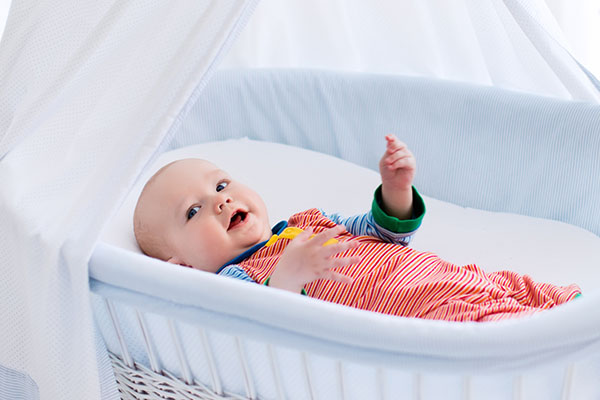
Most bassinets are mobile and easy to place anywhere for naps, and right next to your own bed at night for safe co-sleeping.
This is perfect for added safety and reassurance for baby and you, as well as no-fuss night feeds. A great example is a bedside cosleeper or a sidecar bassinet setup.
But what if your baby won't sleep in their bassinet? Here are 6 reasons why.
We'll also discuss when to go bassinet-free and what to do when baby outgrows the bassinet.
6 reasons why your baby won't sleep in the bassinet
1. Unable to fall asleep without your help
Most newborn babies and babies under 6-8 months of age can't self-soothe to sleep yet. Yes a bassinet is snug and super comfortable for small babies. And it encourages easy settling and sleeping long stretches.
But it's not the magic solution that will help your baby fall asleep and stay asleep for longer stretches.
If your baby needs your help with sleeping at nap times or bedtime, by feeding, nursing, rocking or holding to sleep or wakes up crying and can't go back to sleep, the snug bassinet in itself can't fix this.
✴️ What to do If your baby is unable to fall asleep or go back to sleep
Consider keeping the bassinet closer to your own bed: a sidecar bassinet setup or cosleeper bassinet keeps your baby extra close to you, in their own sleep space, and that can be enough for them to feel safe enough to settle and sleep
Help your baby with settling and sleeping for now to maximize everyone's sleep,
As and when you're both ready: start self-soothing practice with my 8 steps to teach your baby to self-soothe to sleep without crying
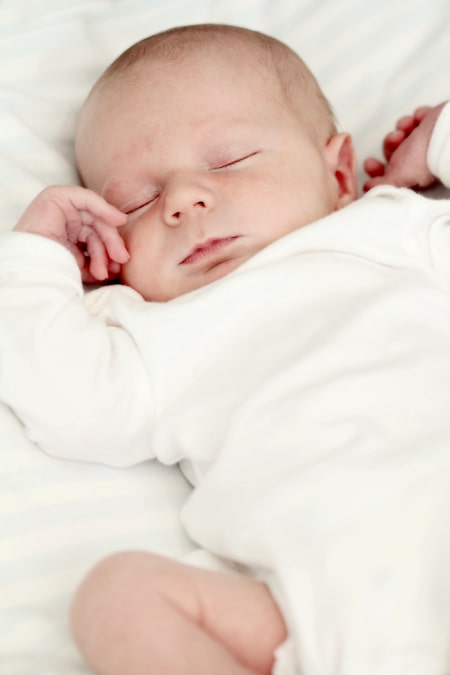
2. The bassinet is too big or too small
Bassinet sizes vary and what's the perfect snug fit for one baby, might be completely off for your newborn or older baby.
You may find your particular bassinet too big to prevent wake ups due to the startle reflex (in the first 2 months) or too small to be comfortable for your baby.
✴️ What to do if the bassinet is the wrong size
Adjust the size only if you can still follow all safe sleep guidelines
If your baby's bassinet is too big, don't be tempted to DIY this and add fabric, pillows or baby sleep positioners to make it smaller. This is against safe sleep guidelines as it increases the risk of SIDS (Sudden Infant Death Syndrome).
Your baby should be sleeping on their back, on an empty flat surface, a firm mattress, and without padding on the sides.
Only if the bassinet has approved and certified size adjustments, can it be safe to reduce the size. Do this only if you know your baby will still be 100% safe and secure.If your baby's bassinet is too small, there may be padding or fabric that you can remove to gain some space.
Of course only do this is the bassinet is still 100% safe and secure for your baby after making more space. For example, you don't want your baby's delicate skin to touch hard plastic or metal pieces while they sleep.
3. The bassinet feels too cold or too hot
Temperature has an immense effect on how well your baby sleeps. So if your baby won't sleep in their bassinet, consider if maybe it's just too hot or too cold.
Too hot is uncomfortable and unsafe, and too cold is also too disagreeable for your baby to sleep easily.
✴️ What do do to keep your baby at the right temperature in the bassinet:
If it's too hot, limit how warmly your baby is dressed and use the lightest covers or sleep sack only. Also reduce the room temperature if possible by cooling or airing the room, having the window open (or closed, depending on climate)
If the bassinet feels too cold make sure your baby is dressed appropriately and wears a suitable sleeping bag. All adjusted to the climate and room temperature.
You can also pre-heat the bassinet with a hot water bottle or heating pad but remember to always remove it before placing your baby in.
The risk of over-heating, and therefore the risk of SIDS, becomes too high if the hot water bottle or heating pad stays in the bassinet with your baby. So always remove the hot water bottle before putting your baby down to sleep, it's important to have your baby comfortable but even more important that they're safe.
4. Your baby wakes crying 30-60 minutes after going to sleep
Waking within 30-60 minutes after falling asleep is typically a digestive issue.
Your baby wasn't burped or didn't burp enough, has gas, baby reflux, food sensitivites or allergies, or simply doesn't digest their before-bed meal quickly enough.
✴️ What to do if your baby won't sleep well in the bassinet because of waking soon after going to bed
Burping well is your first solution to try. Try and burp your baby several times, taking brief pauses during a feed. Also holding your baby upright for at least 20-30 minutes after the last feed, e.g. as part of the evening bedtime routine or before nap times.
Follow my guidelines for relieving gas in your baby to ensure your baby falls asleep as comfortbly as possible. That's your best bet to avoid discomfort and awake soon after starting sleeping in the bassinet.
5. A wet diaper
Many babies wake frequently because of a wet or dirty diaper.
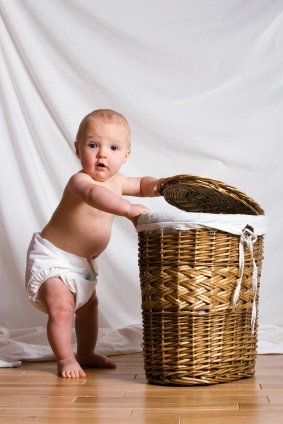
In particular during their time sleeping in a bassinet, it's completely normal for a newborn and young baby to have several soiled diapers, day and night.
✴️ What to do when it's a dirty diaper keeping your baby from sleeping in the bassinet
To prevent your baby to stay awake because of a wet diaper, look into the best-fit and highest absorbency diaper that suits your baby.
Add a booster pad or try overnight diapers: these help keep your baby dry, and therefore sleep longer. This way, they're more comfortable and that makes it easier for your baby to fall back asleep on their own or with a only a brief intervention by you for minimal awake time.
See the dedicated article with more detailed advice for how to keep a wet diaper from disturbing your baby's sleep.
6. The bassinet just isn't right for your baby
Some babies just don't sleep well in a bassinet and we don't know why.
For some it's the size, the materials, the height, where it sits in their sleep space, unexpected noises (try white noise), or even the snugness that helps so many babies sleep well in a bassinet just doesn't do it for others, etc.
I know, as a parent it's difficult to know if it's purely that the bassinet isn't right for your baby to sleep in, or if something else is going on.
✴️ What to do if sleeping in the bassinet just doesn't seem right for your baby:
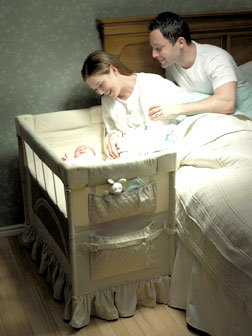
- Go over the other 5 reasons above and see if they ring true, and if the solutions help your baby with falling asleep and staying asleep in the bassinet,
- If you feel it's due to the type of bassinet, we have parent reviews for the Tiny Love bassinet, and the Arm's Reach cosleeper,
- Look into the 12 common reasons of frequent waking, to see if any of those are at play,
- Contact me if you're unsure about what do with the bassinet for your baby to sleep in, I'm happy to help.
When to switch to the crib and go bassinet-free
The right bassinet age is from newborn and up to 4-6 months old. More specifically, the bassinet will no longer be safe to sleep in once your baby starts rolling over.
If your baby starts rolling over at an earlier age, say around 2-3 months of age, it's also time to switch from the bassinet to the crib or cot immediately.
Even when they're just practicing rolling over, they can get themselves into unsafe sleeping positions. And this increases the risk of SIDS (sudden infant death syndrome).
You can of course decide to switch from bassinet to crib anytime sooner
Whenever you feel your baby won't sleep in the bassinet comfortably anymore, or it gets too small or for any other reason: a good crib will always be a good alternative.
What to do when baby outgrows their bassinet
Switching from bassinet to crib is easiest with a gradual transition. So when your baby outgrows the bassinet:
- To start, place the crib exactly where the bassinet was, or as nearby as possible. After the first few nights you can of course move the crib to a different location if you prefer,
- The first few nights, have your baby in the same PJs and baby sleep sack as when in the bassinet - don't wash them for the switch because the familiar scent helps your baby feel safe in spite of the new environment.
- Have the unwashed - again the scent helps your baby sleep feeling safe and reassured - sheets from the bassinet nearby during the first week of the transition.
You won't be able to have them safely inside the crib but place them safely attached on the outside for the first few nights,
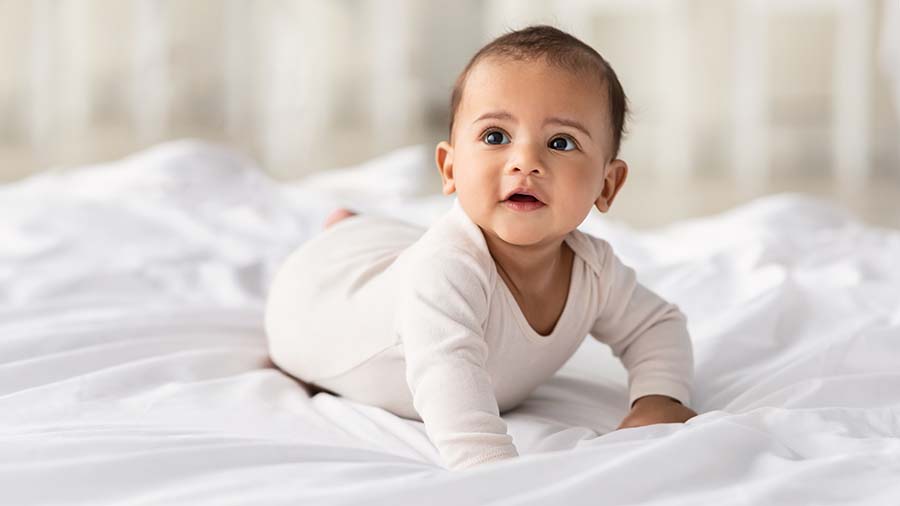
- If your baby had a toy, stuffed animals or musical mobile attached to the bassinet that helped them fall asleep, be sure to attach the same on to the crib as well (safely so baby can't reach!),
- The first 5-7 nights, avoid changes to your baby's sleep schedule, nap and night bedtimes, bedtime routine and feeding schedule,
- Remember all crib safety guidelines: besides keeping your baby safe, they also support optimal sleep
- Around this age is ideal to start progressive self-soothing to sleep practice. This will help your baby sleep well after the switch from bassinet to crib or cot.
What to do if your baby won't sleep in the crib after the switch from bassinet
If you did all the above gradual transition tips, and your baby's crib is a safe and pleasant place to sleep, and your baby doesn't sleep well, think of the following:
Is your baby comfortable? Remedy potential discomforts and sleep disturbers,
Is your baby's sleep schedule nicely adjusted? Look into age-appropriate sleep schedules,
Have you got all healthy sleep habits set up? Review our good sleep habits advice, in Step 1 of this article here,
Is your baby ready to practice self-soothing to sleep? Follow my truly-no-tears self-soothing guidelines
In summary, if your baby won't sleep well in their bassinet, start with looking for any of the 6 reasons above for why they can't fall asleep or stay asleep well.
Remedying these 6 reasons will help your newborn and older baby get better sleep, in a safe sleep environment. This can avoid many sleepless nights, and give more deep sleep and a happily sleeping baby overall.
Article Author: Heidi Holvoet, PhD - Founder, senior sleep consultant

Heidi Holvoet, PhD, is the founder of the Baby Sleep Advice website and movement, an award-winning author, baby & toddler sleep consultant with 17+ years experience as well as a certified lactation counselor.
Over the years, Heidi has received several awards inluding a Mom's Choice Award (MCA) and National Parenting Awards (NAPPA) for her Baby Sleep Advice website, programs and books. Also, Baby Sleep Advice was awarded "Most Trusted Infant's Sleep Solutions Company 2023" in the Benelux Enterprise Awards 2023.
Heidi continually conducts personal research and participates in continued education and in that way stays up to date with current scientific and pyschosocial infant care.
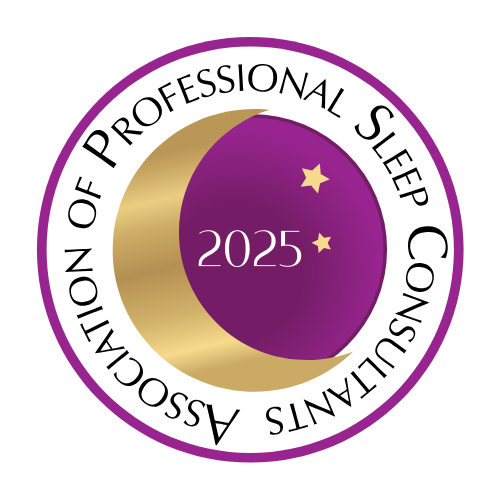
She is also a member of the Association of Professional Sleep Consultants of which she was one of the earliest contributors. She obtained her PhD degree in physics at the University of Ghent in Belgium.
Heidi is passionate about helping babies and their parents sleep more and better, with her trademark holistic and truly-no-tears approach that has been proven and praised time and again by parents worldwide to be effective and truly no-tears. Respect for you as a parent and your baby, is at the heart of Heidi's warm and kind support. Her approach always keeps in mind a baby's needs and abilities at any given age, is based on pediatric science and the most up to date knowledge in infant care and sleep science.
As well as the award-winning baby sleep programs, Heidi offers popular 1:1 consults and easy-access 30-minute SOS Sleep sessions.
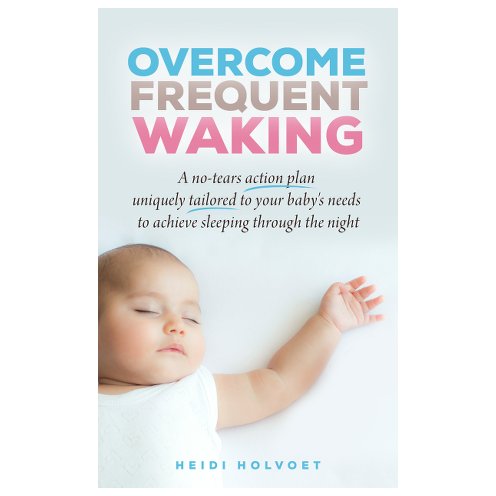
Overcome Frequent Waking: e-book + support
by Heidi Holvoet, PhD

A Bedtime Routine: Settling To Sleep Like A Charm
by Heidi Holvoet, PhD
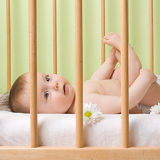
Crib safety guidelines
by Heidi Holvoet, PhD

Acid reflux
by Heidi Holvoet, PhD

Why is sleep important?
by Heidi Holvoet, PhD

